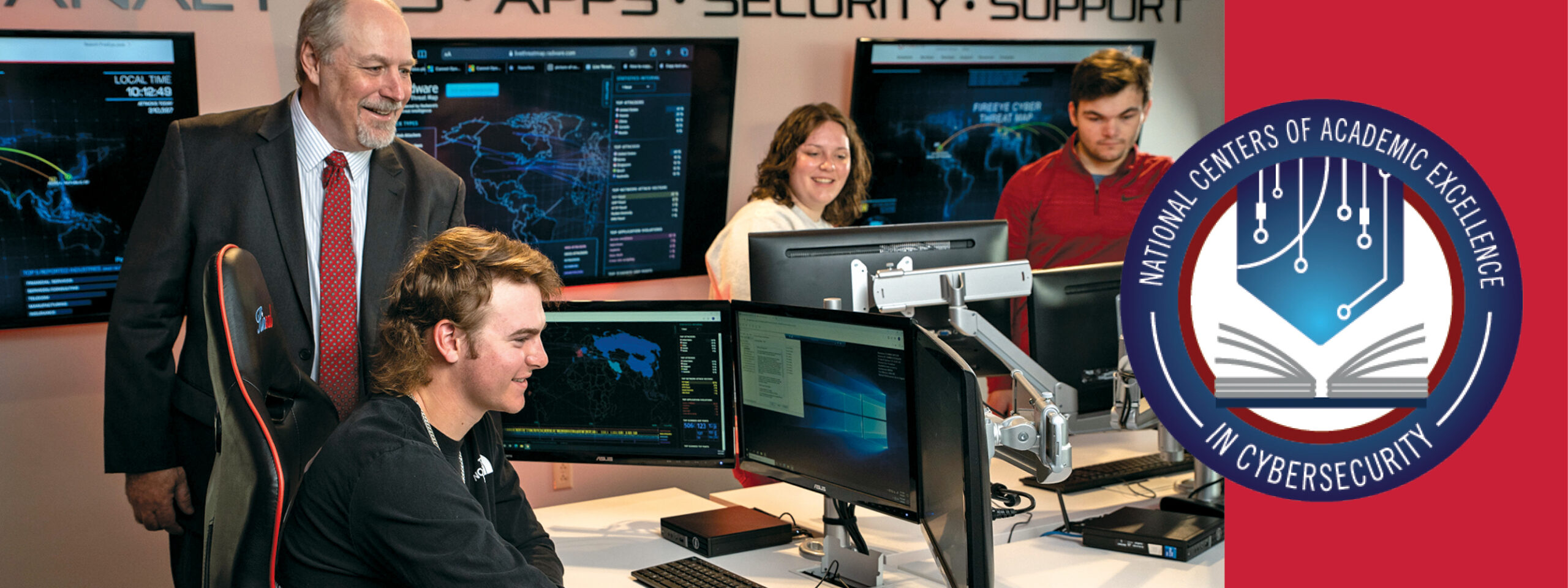A “crowning achievement” for Maryville brings opportunities for students.
Maryville students, faculty and alumni are celebrating a new classification establishing the University’s cybersecurity program as a top contender among U.S. institutions of higher education.
Following a rigorous application process, the National Security Agency (NSA) designated Maryville as a National Center of Academic Excellence in Cyber Defense (CAE-CD) for its undergraduate program. The approval means the program is now listed as a CAE-CD, a designation awarded to regionally accredited academic institutions offering cybersecurity degrees and/or certificates at the associate, bachelor’s and graduate levels. The classification makes Maryville a distinguished center of learning for the fast-growing discipline, according to assistant professor of cybersecurity Brian Gant, EdD, ’21.
“It’s definitely a crowning achievement,” Gant said.
Leaders of Maryville’s cybersecurity program, established in 2014, spent several years in pursuit of the designation. It was a thorough process that involved demonstrating best standards and academic excellence — basically showing that “you have to actually be doing what you say you’re doing,” Gant said.
While the application involved many hours of work on the part of those in the cybersecurity program, it also required campuswide dedication. “It’s not just a commitment involving the curriculum, but also the commitment of the University’s president and the entire institution,” Gant said.
ADDED VALUE FOR STUDENTS
Benefits of the new CAE-CD designation are manifold and include opening access to a network of schools across the nation holding the NSA designation. Gant said the relationships born out of these connections will boost internship and partnership possibilities. “To be able to say that you’re at an NSA-designated institution boosts your chances for positions,” Gant said. “Even when the curriculum is already there, the classification increases confidence in a university.”
Cybersecurity major Reed Huskey, ’23, was involved in the NSA application, participating in interviews and working with a mentor. “The classification demonstrates that our material is robust and changes to keep up with the ever-evolving world of cybersecurity,” Huskey said.
Huskey interned for Caterpillar Inc., where he now serves as a security operations center analyst. Huskey said the CAE-CD designation puts a federal stamp of approval on the program, which already attracts high-caliber professors who work in the field. “These professors give you a good feel for which area of cybersecurity you’re interested in and how that translates into an actual career,” Huskey said. “That’s a big benefit for students.”
Like Huskey, Jada Turner, ’23, feels lucky to have learned so much about the professional realm through her instructors. Calling herself an “overthinker,” Turner said instructors welcomed her frequent questions, something she believes will make her a better employee when she begins working after graduation at Emerson Electric Co. as a cloud security analyst.
Even though Drew Klauser, ’20, ’21, graduated before the University earned its CAE-CD classification, his degree will reflect the elevated status because it’s based on the curriculum in place during his time at Maryville. In his job as a security analyst for Boston-based ezCater, Klauser’s responsibilities include hiring. “Being an NSA-accredited school carries a lot of weight,” Klauser said. Similarly, prospective students will quickly find Maryville when they search for an NSA-designated program.
MASTER’S PROGRAM ALMOST READY TO APPLY
Cybersecurity employees work to protect an organization’s networks, devices and data. Many jobs involve addressing security incidents, testing for potential threats or working on risk management, policy and governance. When people hear the word “cybersecurity,” they often think of Microsoft, Google or Facebook. But you’ll find cybersecurity professionals working in every industry.
“Every organization has a computer network,” Gant said. “From the federal government to retail.” According to Cyber Seek, there are 65 cybersecurity professionals — most of them already employed — for every 100 job postings. The demand is also evidenced by the success of Maryville cybersecurity graduates, 98% of whom have positive career outcomes. Many succeed with a bachelor’s degree alone, but earning a master’s prepares cybersecurity professionals for important certifications and can add to their lifetime earnings, according to Cliff Wilke, PhD, Maryville graduate cybersecurity instructor and program coordinator.
“We’re proud to have achieved this designation,” Wilke said. “We have a great program, and receiving this designation is another cornerstone that brings opportunities for Maryville students.”
To learn more about the Maryville University Cybersecurity program, visit our website.
